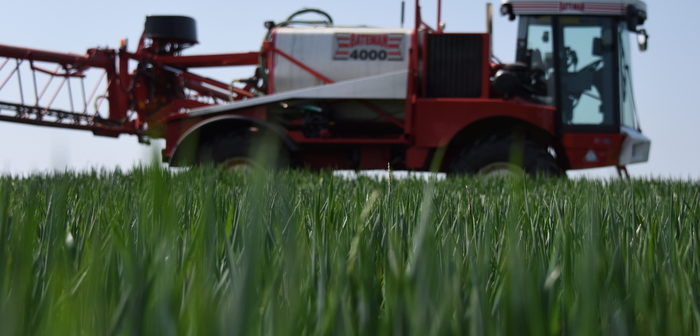Corteva Agriscience has launched a new oilseed rape herbicide at Cereals 2019.
Corteva spun from DowDuPont on 1 June to create an independent, global company centred on maximising yields and profitability for farmers.
Discovery and innovation will be at the heart of the brand and the launch of Belkar at the UK’s largest arable industry event in Lincolnshire gives growers an indication of what they can expect from Corteva in the future.
Belkar gives oilseed rape growers the option to switch from preventative to reactive autumn weed control strategies.
Targeting cleavers, cranesbill, poppy, shepherds purse and fumitory, Belkar offers an alternative to traditional approaches which rely on pre-emergence control.
Growers can wait until the crop is out the ground giving themselves time to assess the visible weed pressure plus the impact of pests.
Arylex Active – the key molecule in Corteva’s cereal herbicides Pixxaro and Zypar – has been formulated with picloram, known to growers from Galera, to create Belkar.
UK & Ireland Country Leader Adrian Gough said: “Our heritage brands were synonymous with innovation and delivering new chemistry and seed to market.
“That has given Corteva a fantastic foundation upon which to grow and this will ultimately benefit UK farmers as we deliver what is the most exciting pipeline in the industry.
“The launch of Belkar today is a sign of things to come from Corteva.”
Product manager John Sellars expects Belkar to be a product which challenges the traditional approach to weed control in oilseed rape.
“We mustn’t forget that in 2016 oilseed rape establishment was very good, but it has been followed by two difficult years,” Mr Sellars said.
“Growers are looking for alternative strategies to help manage the risk in their own situations.”
Mr Sellars believes growers will be more cautious about front-loading their crop protection investment.
“Growers are happy to invest if they know they are going to have an output. Moving to a post-emergence regime means growers don’t decide on their herbicide spend until they know a crop is there,” he added.
Arylex Active has been in cereal herbicides since 2015 with the ability to control most key competitive weeds without affecting brassicas, making it an obvious fit for the oilseed rape market.
There are three treatment options which Corteva says have performed best in trials.
At two true leaves an application at 0.25l/ha will take out the weeds which have germinated alongside the crop and, in some circumstances, that will be enough broad-leaved control before an application of Astrokerb (propyzamide + aminopyralid) or similar later on.
In high weed pressure situations where a second germination is visible growers have the option of a second 0.25l/ha two-to-four weeks after the first application.
In low pressure situations growers can wait until six true leaves of the crop and apply 0.5l/ha which will take care of the weeds going in to the autumn.
The spray period is from 1 September to the end of December.




